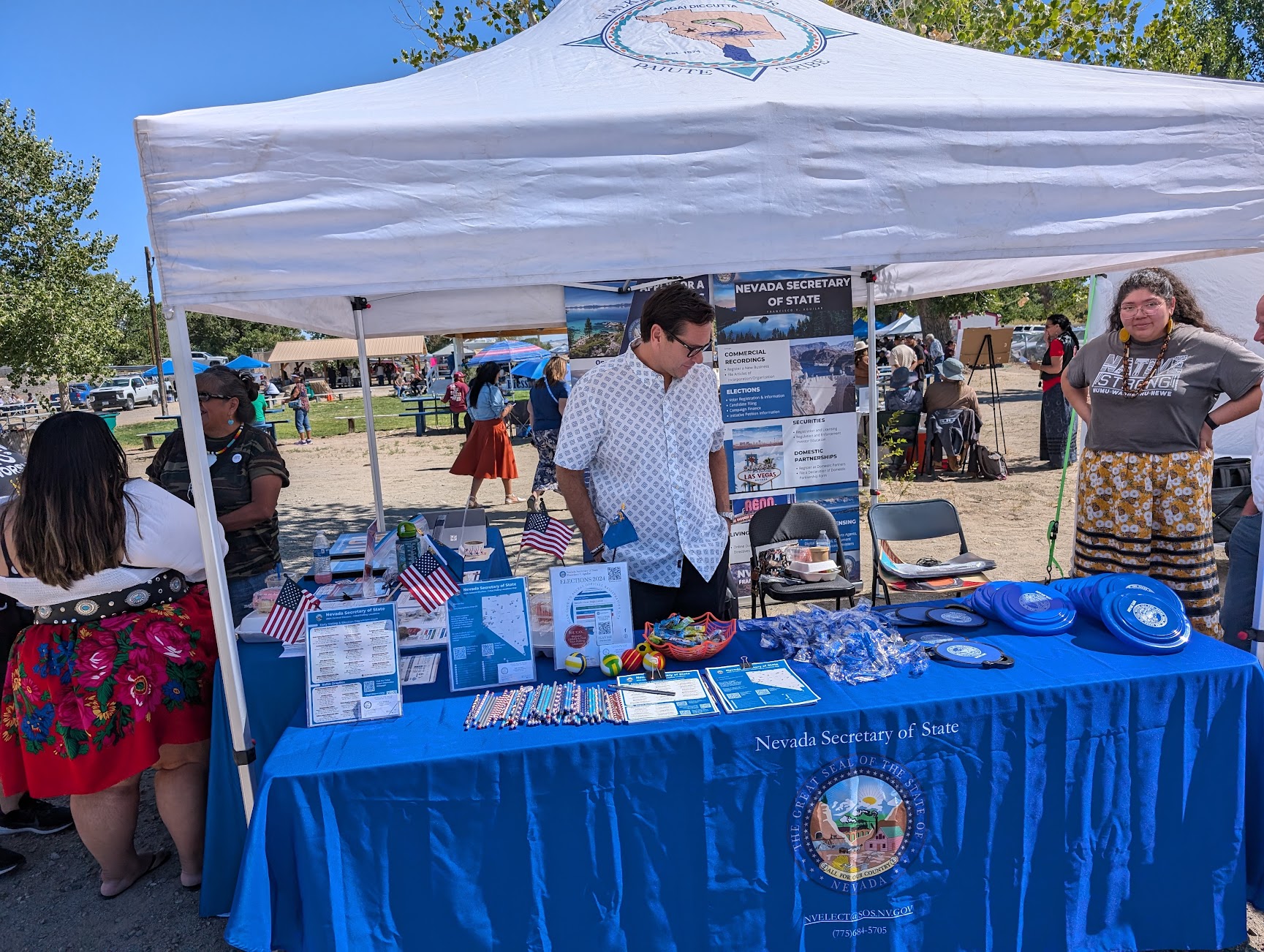Early voting isn’t scheduled to begin for another 25 days, but the first votes in Nevada’s 2024 election cycle have started to roll in through the state’s digital absentee voting system.
As of Monday, in a historic first, two ballots have been cast via the digital application by Native American voters living on a reservation or colony.
The secretary of state’s office kicked off the online voting option for this election cycle Saturday at the Walker River Paiute Tribe’s 93rd annual Pinenut Festival. The launch and digital voting option are part of an effort to increase voter turnout among the state’s Native American communities.
Members of Nevada’s 28 Indigenous nations, bands and colonies have faced long-standing historical and geographic obstacles to casting a ballot, including long journeys to polling locations or ballot drop boxes, lack of voter registration opportunities and unreliable mail services.
“For much of United States history, Native Americans have faced countless barriers to citizenship and basic voting access. Some of those barriers can be internet connectivity or distance to polling locations,” Secretary of State Cisco Aguilar, a Democrat, said in remarks at the launch. “Our office is dedicated to working with tribes to find creative solutions and improve the access to vote.”
Aguilar also announced that the office had hired a tribal outreach coordinator, Walker River Paiute Nation citizen Cal Boone, to work with the tribes on behalf of the secretary of state’s office.
Boone explained how to use the secure digital system, known as Nevada’s Effective Absentee System for Elections (EASE), to voters at the festival. The system allows people to register to vote, receive a ballot and cast it entirely online.
Some festival attendees also took home informational flyers about the program so they could conduct personal research on candidates and ballot questions before casting their votes.

Though internet access is needed to access EASE, tribal voters who can connect to their tribal administration’s Wi-Fi or have access to cell service can use the electronic system. Proponents of the program say it overcomes historical barriers and increases tribal members’ options for casting a ballot and participating in the election.
Tribal citizens must choose the Nevada tribal land that they reside on before confirming voter registration details and marking their ballot.
Established in 2014, EASE was designed to accommodate active duty members of the United States Armed Forces, their spouses and dependents, and Nevada voters living outside the country. The voting option expanded to residents with disabilities who may struggle to get to a voting location in 2021.
A law passed in 2023 allowed tribal citizens who live on a reservation or colony to use the system. Though Native American voters had access to the system during the primary elections and presidential preference primary, they did not use it.
Estimates based on U.S. Census data place Nevada’s Native American voting-age population at about 70,000 people. The option to use EASE is new for Native Nevadans, and it’s unlikely to be used by the entire population because the bill just recently passed.
However, experts have noted that adoption rates of the program are increasing, and that’s in part because of outreach. The more that the Nevada Native American population knows about EASE, the more that number is expected to rise.
It’s difficult to quantify Native voter turnout rates because of the lack of data collection for the demographic, unlike for Latino, Black and Asian voters. But in spite of the data gaps, leaders behind the Native vote mobilization efforts in Nevada in 2020 said that turnout was historic, with some experts saying turnout in 2020 was up 25 percent from 2016.

The expanded voting options and higher turnout rates are the result of decades of advocacy and a 2016 lawsuit from the Pyramid Lake and Walker River Paiute tribes, which sued the secretary of state and two counties for violating the Voting Rights Act of 1965. The lawsuit noted some people living on reservations had to drive 96 round-trip miles to access in-person voter registration and voting booths because there were no polling locations on reservations, along with other prohibitive voting barriers.
The court ruled in favor of the tribes, requiring satellite polling locations at the reservations ahead of the election that year. In the time since then, members of Native American tribes in Nevada launched nonpartisan and nonprofit organizations geared toward increasing turnout and have advocated for policies to increase voter access.
State lawmakers have also passed legislation aimed at improving election systems, including legislation in 2023 that requires county clerks who serve tribal areas to meet with the tribes in odd-numbered years to discuss upcoming elections, polling places and assistance a tribe will need, and a 2021 law that allows tribes to request gubernatorial approval for tribal agencies to become automatic voter registration agencies.
Aguilar said that in this year’s general election, there will be 18 Election Day locations, 12 early vote locations and eight ballot drop boxes on tribal land. He added that the secretary of state’s office is working closely with tribes to encourage tribal citizens to become poll workers on their reservations and colonies.
Editor’s note: This story appears in Indy Elections, The Nevada Independent’s newsletter dedicated to comprehensive coverage of the 2024 elections. Sign up for the newsletter here.

